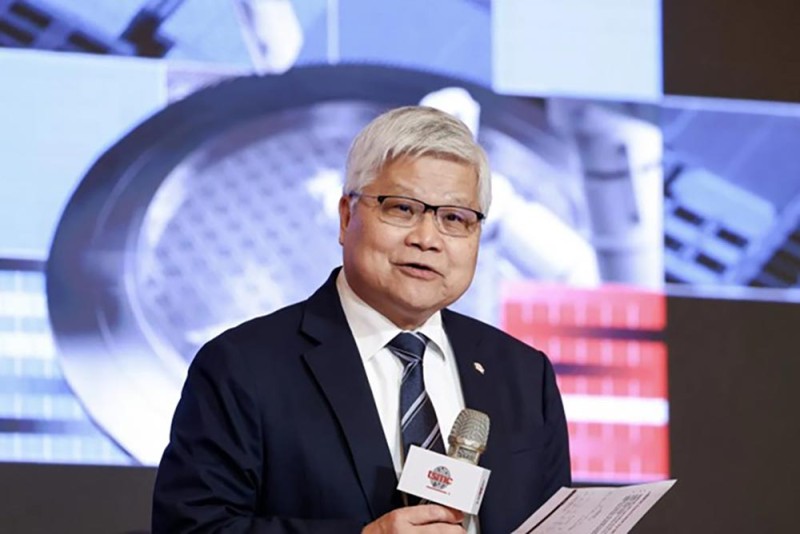
台积电(Taiwan Semiconductor Manufacturing Company)无疑是全球最重要的公司之一,这也使得其行事略显低调的首席执行官魏哲家(C.C. Wei)跻身商界最具影响力人物之列。
魏哲家于今年3月成为焦点,彼时他与美国总统唐纳德·特朗普在白宫共同宣布,将追加1,000亿美元的投资,以支持台积电在美国亚利桑那州的业务拓展。
“倘若10年前有人告诉我,我会与美国领导人会面,共同商讨数千亿美元的投资事宜以拓展全球业务版图,我会认为他们是在开玩笑。”魏哲家在写给《财富》杂志的评论中表示。
在今年的《财富》世界500强榜单(根据营收规模对全球最大企业进行年度排名)中,台积电跃升60位,名列第126位。2024年,该公司的营收增长30%,总额超过900亿美元。
台积电也是今年榜单中盈利排名第13位的公司,盈利高达360亿美元,超过了美国银行(Bank of America)、埃克森美孚(Exxon Mobil)和丰田(Toyota)。此外,台积电是仅有的两家市值突破1万亿美元的非西方公司之一,另一家是沙特阿美(Saudi Aramco)。
台积电于2015年跻身《财富》世界500强,名列第472位。此后排名稳步上升,并于2023年超越其美国竞争对手英特尔(Intel)。
人工智能热潮有望为台积电的进一步发展注入动力。在最近一个季度,台积电的营收同比增长超过40%,达到301亿美元。其中,高性能计算部门贡献了60%的销售额,该部门业务涵盖人工智能和5G应用。
“在人工智能需求强劲增长以及云服务提供商持续加大资本支出的双重驱动下,台积电的短期发展前景尤为强劲。”市场调研机构Counterpoint Research的高级分析师威廉·李(William Li)表示。
台积电的首席财务官黄仁昭(Wendell Huang)预计人工智能将持续推动公司业务加速发展,未来五年复合年增长率将维持在45%上下。
尽管黄仁昭留意到人工智能在消费和企业领域日益普及,但他也对一个相对较新的发展趋势感兴趣,即“主权人工智能”。
当下,众多国家政府正在寻求对整个人工智能技术栈,涵盖数据集、数据中心、人工智能模型以及应用程序,实现更大程度的国内管控。其目的在于推动本土发展,降低对当下人工智能领域两大领军者——美国和中国的依赖。对本土设施加大投资力度,反过来又会刺激对英伟达(Nvidia)的图形处理单元(GPU)等人工智能芯片的需求,进而推动台积电等芯片制造商的销售额提升。
是什么让台积电成为市场领导者?
分析师指出,台积电在前沿技术领域的主导地位、交付高性能芯片的能力,以及与英伟达、苹果(Apple)等关键客户的紧密联系,是其成功的关键。
但黄仁昭认为,台积电的成功源于更为根本的因素:该公司纯粹是一家芯片代工厂,自身并无产品。这意味着它既无法也不会与客户展开竞争。
以台积电的两大主要竞争对手三星电子(Samsung Electronics)和英特尔为例,这两家公司在从事芯片制造业务之外,还销售自有设备。三星销售智能手机,而英特尔则销售计算机及其他个人电脑——这些产品可能与潜在客户销售的产品形成竞争。
黄仁昭补充道,台积电能够提前数年与客户展开合作,这让该芯片制造商得以凭借投资与创新,打造出契合客户需求的产品。
地缘政治与全球扩张
鉴于台积电的重要地位,以及其总部设于中国台湾这一事实,意味着这家芯片制造商是少数几家决策会产生地缘政治影响的公司之一。
“台积电战略重要性的提升意味着其难以在中美科技竞争的漩涡中独善其身。”国际数据公司(IDC)的亚太区半导体研究高级经理盖伦·曾(Galen Zeng)表示。
不过,在美国允许英伟达等公司重新开始向中国出售部分领先的人工智能处理器后,台积电或许可以从中美科技冲突的短暂缓和中受益。“这对它们来说是绝佳喜讯,对台积电而言同样如此。”魏哲家在几周前对股东表示。
如今,台积电的大部分工厂都位于中国台湾。其在中国大陆设有两家工厂,并在美国亚利桑那州和日本熊本县开设了新代工厂。台积电目前还在德国建设一家新工厂。
这家芯片制造商始终表明,海外代工厂是直接响应客户需求的结果。
在邮件里,魏哲家称许多客户向他强调这些海外工厂“至关重要”,并“强调台积电世界级制造专长与生产地域灵活性的重要性”。他表示自己并非“地缘政治专家”,并称自己以“能够精准洞察客户需求并给出解决方案”为荣。
魏明哲还回忆起创始人张忠谋(Morris Chang)曾经提醒高管们要“不遗余力地满足客户需求”。对于台积电在全球营收规模最大企业的排名中持续攀升,他保持谦逊态度。
“在《财富》世界500强榜单中排名提升,着实令人备受鼓舞。”他写道,“但我们成功的最佳证明,是倘若我们的客户也可以跻身榜单——甚至排名超越台积电。”(*)
译者:中慧言-王芳
台积电(Taiwan Semiconductor Manufacturing Company)无疑是全球最重要的公司之一,这也使得其行事略显低调的首席执行官魏哲家(C.C. Wei)跻身商界最具影响力人物之列。
魏哲家于今年3月成为焦点,彼时他与美国总统唐纳德·特朗普在白宫共同宣布,将追加1,000亿美元的投资,以支持台积电在美国亚利桑那州的业务拓展。
“倘若10年前有人告诉我,我会与美国领导人会面,共同商讨数千亿美元的投资事宜以拓展全球业务版图,我会认为他们是在开玩笑。”魏哲家在写给《财富》杂志的评论中表示。
在今年的《财富》世界500强榜单(根据营收规模对全球最大企业进行年度排名)中,台积电跃升60位,名列第126位。2024年,该公司的营收增长30%,总额超过900亿美元。
台积电也是今年榜单中盈利排名第13位的公司,盈利高达360亿美元,超过了美国银行(Bank of America)、埃克森美孚(Exxon Mobil)和丰田(Toyota)。此外,台积电是仅有的两家市值突破1万亿美元的非西方公司之一,另一家是沙特阿美(Saudi Aramco)。
台积电于2015年跻身《财富》世界500强,名列第472位。此后排名稳步上升,并于2023年超越其美国竞争对手英特尔(Intel)。
人工智能热潮有望为台积电的进一步发展注入动力。在最近一个季度,台积电的营收同比增长超过40%,达到301亿美元。其中,高性能计算部门贡献了60%的销售额,该部门业务涵盖人工智能和5G应用。
“在人工智能需求强劲增长以及云服务提供商持续加大资本支出的双重驱动下,台积电的短期发展前景尤为强劲。”市场调研机构Counterpoint Research的高级分析师威廉·李(William Li)表示。
台积电的首席财务官黄仁昭(Wendell Huang)预计人工智能将持续推动公司业务加速发展,未来五年复合年增长率将维持在45%上下。
尽管黄仁昭留意到人工智能在消费和企业领域日益普及,但他也对一个相对较新的发展趋势感兴趣,即“主权人工智能”。
当下,众多国家政府正在寻求对整个人工智能技术栈,涵盖数据集、数据中心、人工智能模型以及应用程序,实现更大程度的国内管控。其目的在于推动本土发展,降低对当下人工智能领域两大领军者——美国和中国的依赖。对本土设施加大投资力度,反过来又会刺激对英伟达(Nvidia)的图形处理单元(GPU)等人工智能芯片的需求,进而推动台积电等芯片制造商的销售额提升。
是什么让台积电成为市场领导者?
分析师指出,台积电在前沿技术领域的主导地位、交付高性能芯片的能力,以及与英伟达、苹果(Apple)等关键客户的紧密联系,是其成功的关键。
但黄仁昭认为,台积电的成功源于更为根本的因素:该公司纯粹是一家芯片代工厂,自身并无产品。这意味着它既无法也不会与客户展开竞争。
以台积电的两大主要竞争对手三星电子(Samsung Electronics)和英特尔为例,这两家公司在从事芯片制造业务之外,还销售自有设备。三星销售智能手机,而英特尔则销售计算机及其他个人电脑——这些产品可能与潜在客户销售的产品形成竞争。
黄仁昭补充道,台积电能够提前数年与客户展开合作,这让该芯片制造商得以凭借投资与创新,打造出契合客户需求的产品。
地缘政治与全球扩张
鉴于台积电的重要地位,以及其总部设于中国台湾这一事实,意味着这家芯片制造商是少数几家决策会产生地缘政治影响的公司之一。
“台积电战略重要性的提升意味着其难以在中美科技竞争的漩涡中独善其身。”国际数据公司(IDC)的亚太区半导体研究高级经理盖伦·曾(Galen Zeng)表示。
不过,在美国允许英伟达等公司重新开始向中国出售部分领先的人工智能处理器后,台积电或许可以从中美科技冲突的短暂缓和中受益。“这对它们来说是绝佳喜讯,对台积电而言同样如此。”魏哲家在几周前对股东表示。
如今,台积电的大部分工厂都位于中国台湾。其在中国大陆设有两家工厂,并在美国亚利桑那州和日本熊本县开设了新代工厂。台积电目前还在德国建设一家新工厂。
这家芯片制造商始终表明,海外代工厂是直接响应客户需求的结果。
在邮件里,魏哲家称许多客户向他强调这些海外工厂“至关重要”,并“强调台积电世界级制造专长与生产地域灵活性的重要性”。他表示自己并非“地缘政治专家”,并称自己以“能够精准洞察客户需求并给出解决方案”为荣。
魏明哲还回忆起创始人张忠谋(Morris Chang)曾经提醒高管们要“不遗余力地满足客户需求”。对于台积电在全球营收规模最大企业的排名中持续攀升,他保持谦逊态度。
“在《财富》世界500强榜单中排名提升,着实令人备受鼓舞。”他写道,“但我们成功的最佳证明,是倘若我们的客户也可以跻身榜单——甚至排名超越台积电。”(*)
译者:中慧言-王芳
Taiwan Semiconductor Manufacturing Company is, undoubtedly, one of the world’s most important companies. And that makes its top corporate executive, the slightly unassuming C.C. Wei, one of the business world’s most important people.
Wei took center stage in March, when he joined U.S. president Donald Trump in the White House to announce an additional $100 billion investment into TSMC’s Arizona operations.
“If someone had told me 10 years ago that I’d meet U.S. presidents to discuss hundreds of billions of dollars in investments to expand our global footprint, I would have thought they were joking,” CEO C.C. Wei told Fortune in written comments.
On this year’s Global 500, Fortune’s annual ranking of the world’s largest companies by revenue, TSMC rose 60 places to reach No. 126 on this year’s Global 500, following a 30% jump in 2024 revenue to reach over $90 billion.
It’s also the 13th most profitable company on this year’s ranking, earning $36 billion in profit, putting it ahead of Bank of America, Exxon Mobil and Toyota. And TSMC is one of just two non-Western companies to surpass $1 trillion in market value, alongside Saudi Aramco.
TSMC joined the Global 500 in 2015, coming in at No. 472. It’s steadily climbed the rankings since then, overtaking its U.S. rival Intel in 2023.
The AI boom is set to propel TSMC even further. In its most recent quarter, TSMC’s revenue rose by more than 40% year-on-year to hit $30.1 billion. Sixty percent of its sales came from its high-performance computing division, which encompasses AI and 5G applications.
“TSMC’s near-term outlook is especially strong, fuelled by robust AI demand and sustained capital expenditures from cloud service providers,” said William Li, a senior analyst at Counterpoint Research.
Wendell Huang, TSMC’s chief financial officer, says he expects AI to continue accelerating the company’s business, with a compound annual growth rate in the mid-40% range over the next five years.
And while Huang is paying attention to growing consumer and enterprise use of AI, he’s also interested in a relatively newer development: “sovereign AI”.
Many governments are now seeking more domestic control over the entire AI tech stack, including datasets, data centers, AI models and applications. The goal is to foster local development and reduce reliance on the U.S. and China, the current leaders in AI. Greater investment in local facilities will, in turn, drive demand for AI chips like Nvidia’s GPUs, and in turn boost the sales of chipmakers like TSMC.
What makes TSMC a market leader?
Analysts point to TSMC’s dominance in leading-edge technologies, its ability to deliver high-performance chips, and its close connections with key clients like Nvidia and Apple for its success.
But Huang thinks TSMC’s success is due to something more fundamental: The company is purely a contract chipmaker, with no products of its own. That means it can’t, and won’t, compete with its customers.
Take two of TSMC’s closest competitors: Samsung Electronics and Intel. In addition to making chips, both companies also sell their own devices. Samsung sells smartphones while Intel sells computers and other personal computers–products that may compete with what their potential customers may also be selling.
Huang added that TSMC can work with customers years in advance, allowing the chipmaker to invest and innovate to make the right product for customers.
Geopolitics and global expansion
But TSMC’s importance, as well as its headquarters on the island of Taiwan, means the chipmaker is one of a handful of companies whose decisions have geopolitical consequences.
“TSMC’s elevated strategic importance means it can’t avoid being affected by U.S.-China tech competition,” said Galen Zeng, senior research manager for semiconductor research at IDC Asia/Pacific.
Still, TSMC may benefit from a brief pause in the U.S.-China tech conflict, after Washington allowed companies like Nvidia to start selling some of their leading AI processors to China again. “It’s very positive news for them, and in return it’s very positive news for TSMC,” Wei told shareholders a few weeks ago.
TSMC currently has most of its plants in Taiwan. It has two in mainland China and has opened new foundries in the U.S. state of Arizona and on the Japanese island of Kumamoto. TSMC is also currently building a new plant in Germany.
The chipmaker consistently says that overseas foundries are a direct response to customer needs.
In his email, Wei said many customers tell him how “crucial” these overseas factories are, “emphasizing the importance of TSMC’s world-class manufacturing expertise with geographic flexibility in production.” He said he didn’t consider himself an “expert in geopolitics,” adding that he takes pride “in being attuned to delivering what my customers require.”
Wei also remembered how founder Morris Chang reminded executives to “jump through hoops” for its customers. And he took a humble position on TSMC’s continued climb up the global rankings of the world’s largest companies by revenue.
“It’s a great encouragement to go up on the Fortune Global 500,” he wrote, “but the best sign of our success is if our customers are on the list—or even higher than TSMC.”

